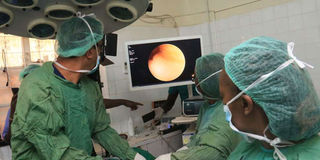Doctors come to the rescue of childless women in counties

A team of doctors conduct a laparoscopic surgery on a patient at ACK Mt Kenya hospital in Kirinyaga county on January 20, 2019. Photo/ JOSEPH KANYI
For eight years, Ann Muthoni, a farm labourer in Kirinyaga County, struggled to conceive. After getting married, Ann was eager to bear children and have a happy family.
When doctors told her that the excruciating pain, severe backache, heavy bleeding and pelvic pain from her periods would end with pregnancy, she looked forward to carrying a baby even more. But she had difficulty conceiving and fought the idea that she could be suffering from infertility. When she did face it, she had an ultrasound which showed she had been pregnant three months before, and that she had ovarian cysts that were standing in the way of her becoming a mother.
She couldn't afford the cost of the surgery to remove them, but a programme dubbed Laparoscopy Mashinani, that has been offering free treatment to women in government hospitals saved the day.
Led by Dr Joseph Njagi, a gynaecologist, 90 women in Mandera, Nyeri, Embu, Tharaka Nithi, Kirinyaga and Meru counties have benefited from laparoscopy surgery to treat infertility and other reproductive health concerns since last June.
Muthoni's cysts were removed at a free medical camp at the Mt Kenya Hospital, when she was 14 weeks pregnant and the baby is growing well.
Laparoscopy services are usually offered at the Kenyatta National Hospital, at Mombasa Level 5 Hospital, and in some private hospitals in major towns.
To bridge the gap in the access to infertility treatment, doctors perform the surgeries at no cost, while the National Health Insurance Fund covers the cost of the operation.
SPECIALISTS
Although Nyeri County bought a laparoscopy and urology tower worth Sh30 million, patients are still seeking services in private hospitals, due to a shortage of specialists. There are only 145 specialists, most of whom work in the private sector, leaving women seeking the services in public health facilities without access.
"With the free surgeries in public hospitals, we are trying to bridge a gap in the healthcare system. We need more doctors trained on laparoscopic surgeries so that, when the government procures machines that are needed in hospitals, there will be a doctor available to operate them," said Dr Njagi, a member of the Kenya Society of Endoscopic Specialities.
“If you tell women in the village to pay for laparoscopy in a private hospital, most of them can’t afford it, yet there are machines lying unused in public hospitals,” added Dr Njagi.
Dr Njagi and his team scout for counties with unutilised laparoscopic towers and pitch tent there for some days to do the operations for free.
In private hospitals, laparoscopic surgery beneficiaries are expected to pay up to Sh500,000, depending on the complexity of the surgery. Doctors performing the surgery are paid for the hours they spend on a patient, while some charge per minute for their services. This means that the procedure is out of the reach of many women who might need it to treat various reproductive health issues.
"Many women are bogged down by reproductive health concerns, yet what they are suffering from can be treated in a day or two," said Dr Njagi.
Unlike open surgery, which involves large cuts, laparoscopy uses smaller incisions – six to 12 inches – with the doctor using a slender tool with a tiny video camera and a light at the end to view the inside of a patient's body.
Surgeons insert the tool through a small cut on the body, then look at the video monitor (outside the body). It is often referred to as minimal invasive surgery and leaves fewer scars, requires the patient to take less medication that open surgery and the longest the patient will be in hospital is two days, compared to weeks for open surgery.
Dr Yamal Patel, a member of the Laparoscopy Mashinani team, says that the surgeries are helping women who have long been marginalised for being barren.



